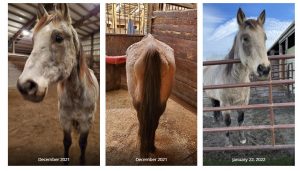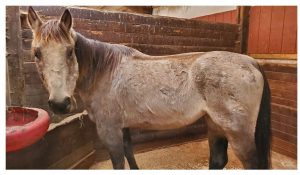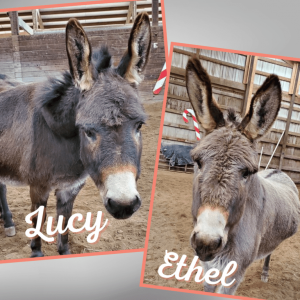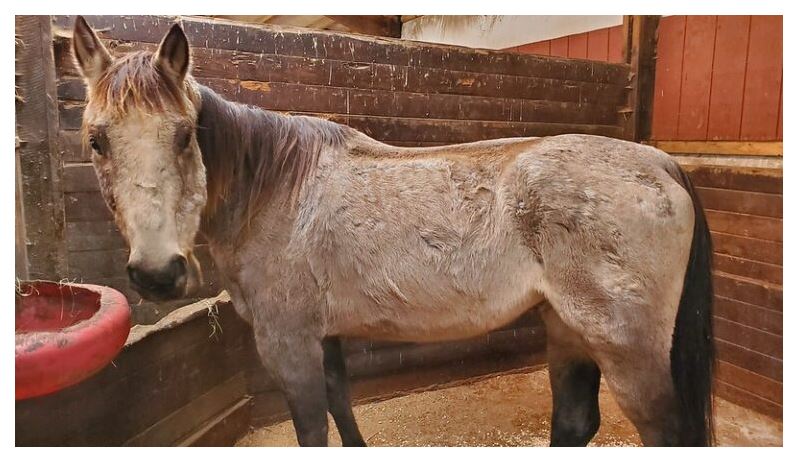November 2021 was a hard one for much of Whatcom and Skagit counties as flooding damaged homes and businesses. Animals were often found in dangerous positions. Skagit Animals in Need (SAIN) is one nonprofit in Skagit that helps assists with large animals in need, but operates in an unusual way: it doesn’t have a facility or paid staff. It has a network of people and these people help in times of need. These volunteers stepped up to help when the waters rose.

Using social media as one resource, SAIN can accomplish its mission: to prevent and respond to animal cruelty and neglect in support of animal control and law enforcement. “Our dedicated volunteers haul hay, haul horses and other livestock, attend events, participate on committees, foster animals, raise awareness and support the mission as needed,” its website says.
The network numbers around 80.
Before and during the floods, the group quickly organized a list of volunteers available to help transport or take care of horses and livestock. The record flooding was anticipated in advance and dealt with as efficiently as possible. One of several Facebook posts also encouraged those both needing help and those available to help to contact them. The post was shared 83 times. Another had a number of trailers mobilized and ready to go, as well as boats and hay.
“People have really big hearts,” a SAIN representative shares. In addition to the floods, the group was contacted by a park ranger during the summer as a horse trailer, hauling horses to Sedro Woolley, had a broken axle. Since the group doesn’t have a public phone number, unless listed on specific posts, the request was put through Facebook. The trailer was by Ross Lake in the mountains. A tow truck could handle the trailer but not the horses. SAIN came to the owner’s aid and an empty trailer was driven to the lake. The horses safely got to their destination.

Samantha “Sam” Cabaluna, who serves as both the group’s chair and in charge of the communications, has a long background professionally in communications. Surprisingly, she doesn’t have any horses. She wanted to volunteer in the community and found a place with SAIN. Cabaluna said SAIN was founded by a former animal control officer, who realized there was a need not being met: there was no place for large animals to go being taken from cases of cruelty and neglect.
In addition to horses and cattle—one well-publicized case was of Highland cattle being seized when a farm had a number found dead and dying, Cabaluna shares—the group helps other animals as well, including donkeys, goats and sheep. While some animals are emaciated, others are facing difficulty from being overfed such as two donkeys in SAIN’s care.
Animal lovers can look online for any horses available for adoption as well as see other animals also being rehabilitated in foster homes. Some animals, Cabaluna says may stay in long-term foster care due to their advanced age or degenerative conditions. “In those cases, we typically keep them in long-term foster homes and continue to pay for their care until it’s their time,” she explains. “We are funded 100% by donations.”
How You Can Help

SAIN has ways for others to get involved by volunteering, donating, or fostering. “Foster homes play a crucial role in rehabilitating rescued animals,” explains Cabaluna. “They are in a unique position to help abused or neglected animals learn how to love and trust again. Foster homes can help these animals become more adoptable by providing socialization and basic to advanced training.”
For those considering fostering, SAIN funds the cost of hay, grain, supplements, medical and farrier care, rehabilitation and training. Foster homes must not only have safe fencing and shelter but time and the ability to care and love the animals. This also includes exercise, and the ability to administer medication if needed or transport to veterinary appointments or adoption events. You can apply on their website to be a foster home.
Another way for the public to be involved is to report animal cruelty. Not everyone knows what to do. Traits to look for include if the animal is under weight, may have open wounds, signs of an illness that has not been treated, no regular access to food and water, a matted coat or severely overgrown hooves and nails. If possible, document with photos or videotape with dates, times, and circumstances.
If you witness or suspect animal cruelty, abuse or neglect, contact animal control immediately by calling 360-428-3211 if a non-emergency. If you see cruelty occurring, call 911.





































